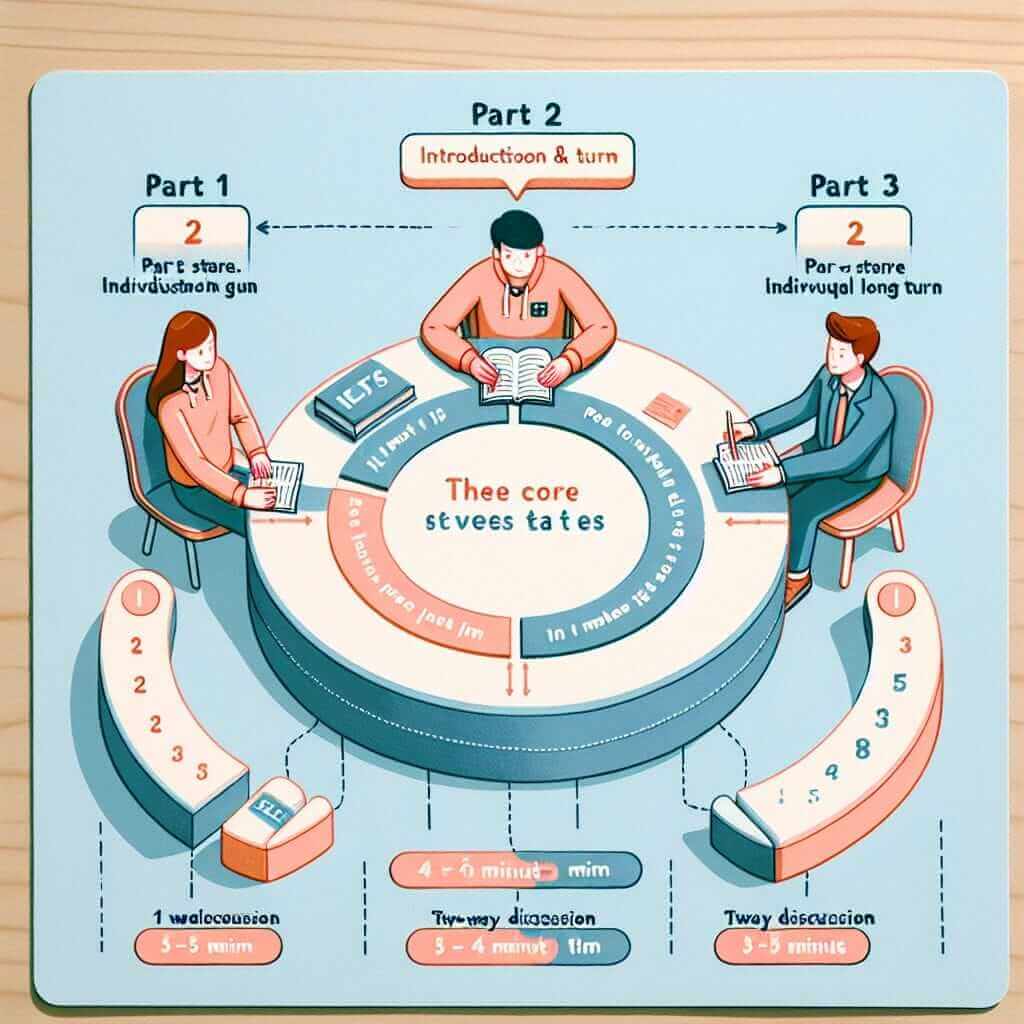The IELTS Speaking test often feels like the most nerve-wracking part of the exam for many candidates. Unlike the other sections, you’re face-to-face with an examiner, and the pressure to perform well in real-time can be intense. However, understanding the format, scoring criteria, and what the examiners are looking for can make all the difference. This guide will demystify the IELTS Speaking test, providing you with the knowledge and confidence to succeed.
Understanding the Format and Structure
The IELTS Speaking test is a one-on-one assessment with a certified IELTS examiner and lasts between 11-14 minutes. It is divided into three parts:
Part 1: Introduction and Interview (4-5 minutes)
- You will be asked a series of questions about yourself, your interests, and familiar topics like your hometown, work, or hobbies.
- This part is designed to ease you into the test and assess your ability to communicate basic information.
Part 2: Individual Long Turn (3-4 minutes)
- You will be given a topic card with a specific subject and some prompts.
- You have one minute to prepare a short talk (1-2 minutes) on the topic.
- The examiner will ask one or two follow-up questions after your talk.
Part 3: Two-Way Discussion (4-5 minutes)
- The examiner will engage you in a more in-depth discussion related to the theme of Part 2.
- This section assesses your ability to express and justify opinions, analyze, speculate, and discuss more abstract ideas.
 IELTS Speaking Test Format
IELTS Speaking Test Format
What are the Examiners Looking For?
While you may be focused on grammatical accuracy, the IELTS Speaking test assesses a broader range of communication skills:
Fluency and Coherence: This refers to your ability to speak at a natural pace, without long pauses or hesitations, and connect your ideas logically.
Lexical Resource: The examiner assesses the range and accuracy of your vocabulary. Using a variety of words and expressions relevant to the topic is crucial.
Grammatical Range and Accuracy: You should demonstrate control over a variety of grammatical structures. While minor errors are acceptable, consistent mistakes will impact your score.
Pronunciation: This doesn’t mean having a perfect accent. It’s about speaking clearly, using appropriate intonation, and ensuring your words are understandable.
Tips to Ace Your IELTS Speaking Test
Practice Regularly: Speak English as much as possible in the lead-up to your test. Find a language partner, record yourself, and practice answering sample Speaking test questions.
Expand Your Vocabulary: Actively learn new vocabulary related to common IELTS topics like education, technology, and the environment.
Master Common Grammatical Structures: Focus on using a variety of sentence structures and tenses accurately.
Pay Attention to Your Pronunciation: Practice speaking clearly and enunciating your words. Listen to native speakers and imitate their intonation patterns.
Don’t Memorize Answers: The examiner will be able to tell if you’re reciting memorized responses. Focus on developing your ideas naturally and adapting your language to the specific questions asked.
Relax and Be Yourself: It’s natural to feel nervous, but try to relax and speak naturally. The examiner wants you to do well and is there to assess your communication skills, not to intimidate you.
Example Speaking Test Questions
Part 1:
- What do you like to do in your free time?
- Do you prefer to eat at home or at restaurants? Why?
- Tell me about the place you live.
Part 2:
- Describe a time you had to overcome a challenge.
- You should say:
- What the challenge was
- How you dealt with it
- What you learned from the experience
- And explain why this was a significant challenge for you.
Part 3:
- What are some common challenges people face in their personal and professional lives?
- Do you think it’s important to have a positive attitude when facing challenges? Why or why not?
- How can people develop their resilience and ability to overcome obstacles?
Conclusion
The IELTS Speaking test can be daunting, but it is manageable with adequate preparation and practice. Focus on developing your fluency, expanding your vocabulary, and honing your pronunciation. Remember, the examiner is looking for your ability to communicate effectively, not for perfection. Be confident, relax, and let your personality shine through. With the right approach and dedication, you can achieve your desired band score.


